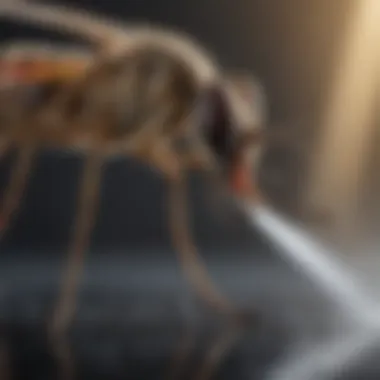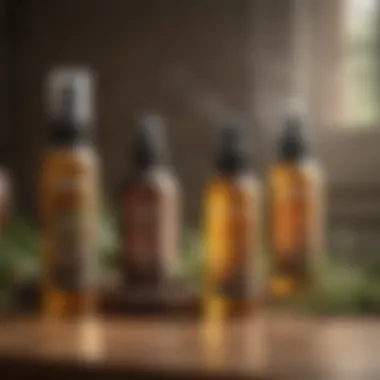Identifying the Best Mosquito Fogger Sprays for Pest Control


Intro
Mosquito control remains a critical issue for many homeowners. In regions where these insects breed, investing in effective solutions is necessary for comfort and health. This article will cover essential aspects of mosquito fogger sprays, focusing on their effectiveness, various formulations, and proper application techniques. By understanding the components of these sprays, homeowners can make informed choices that align with their needs while minimizing health risks and environmental impacts.
Pest Identification
Common Household Pests
The most prevalent mosquito species in residential areas include the Aedes, Culex, and Anopheles mosquitoes. Each species has unique behaviors and breeding preferences that play a role in infestation levels. Understanding these pests can help in selecting the right fogger spray.
Signs of Infestation
Identifying a mosquito infestation can be straightforward. Homeowners may notice increased mosquito activity during the evenings or around still water sources. Common signs include:
- Bites on the skin: Unexplained itchy spots, particularly during evenings or nighttime.
- Swarming behavior: Noticing large groups of mosquitoes in specific areas.
- Breeding sites: Areas with standing water, such as buckets or bird baths.
"Identifying mosquito breeding sources is the first step in effective pest control."
Prevention Methods
Environmental Modifications
Altering the environment is vital in managing mosquito populations. To deter breeding, homeowners can implement these strategies:
- Remove standing water: Regularly empty containers that collect water.
- Maintain landscaping: Trim overgrown vegetation to reduce hiding habitats for mosquitoes.
Home Maintenance Tips
Proper home maintenance is equally crucial. Consider these tips:
- Seal entry points: Ensure doors and windows are fitted with screens without holes.
- Regular cleaning: Clear gutters and drains to prevent water accumulation.
DIY Pest Control Solutions
Natural Remedies
Some homeowners may prefer natural solutions. Effective DIY remedies can include:
- Essential oils: Oils like citronella and eucalyptus can repel mosquitoes when used in diffusers or sprays.
- Garlic spray: A mixture of garlic and water can act as a repellent; the smell deters mosquitoes.
DIY Traps and Barriers
Creating traps and barriers can offer additional protection:
- Sugar and yeast traps: A simple mixture of sugar, yeast, and water can attract and trap mosquitoes.
- Homemade barriers: Install mosquito nets over doors and windows to keep pests out.
Prelims to Mosquito Fogger Sprays
Mosquito control is essential for many homeowners, particularly as the risk of disease transmission increases. The use of mosquito fogger sprays effectively targets these pests, allowing for a proactive approach in managing infestations. Understanding the mechanisms behind mosquito fogger sprays enhances the ability to choose the right product for specific situations. This introduction synthesizes the key elements pertaining to fogger sprays and their role in effective mosquito management.
Efficient pest control ultimately depends not just on product efficacy but also on usage considerations, including safety and environmental impact. Therefore, awareness of types, active ingredients, and application techniques is vital. Each of these components contributes to the overall success of mosquito fogger sprays, making it inevitable for homeowners to grasp their significance.
Understanding Mosquito Infestations
Mosquito infestations can turn any outdoor space into an uncomfortable and hazardous area. These insects are not only a nuisance, but they also pose significant health risks as carriers of diseases like West Nile virus and Zika virus. To effectively combat a mosquito infestation, it is important to understand their life cycle and behaviors.
Mosquitoes thrive in areas with standing water, a major breeding ground where females lay their eggs. They are mostly active during dusk and dawn, making them difficult to combat during peak times. By recognizing these patterns, homeowners can better prepare themselves to take action at the right times. When infestations become apparent, timely intervention using fogger sprays is crucial to reduce populations.
The Role of Fogger Sprays in Pest Control


Fogger sprays play a pivotal role in practical pest control by dispensing insecticides in a fine mist, allowing for thorough coverage of targeted areas. This method is effective due to the fine particles that can reach more nooks and crannies where mosquitoes may hide.
There are various categories of fogger sprays, each designed to meet different pest control needs. Chemical and natural options vary in active ingredients, safety profiles, and environmental impacts. Users should carefully consider these factors when selecting a fogger spray. The ability to minimize mosquito populations while maintaining a safe and sustainable environment is an essential aspect of effective pest control strategy.
Types of Mosquito Fogger Sprays
Understanding the various types of mosquito fogger sprays is essential for effective pest control. Each type offers distinct advantages and can be selected based on individual preferences and specific circumstances. Homeowners should be aware of the differences between chemical, natural, and electric foggers, as this knowledge can significantly influence their success in reducing mosquito populations.
Chemical Foggers
Chemical foggers are among the most widely used mosquito control methods. These products typically contain synthetic active ingredients designed to kill mosquitoes on contact and provide residual protection against future infestations.
One of the key benefits of chemical foggers is their quick action. They can eliminate adult mosquitoes effectively in a matter of minutes. Some active ingredients, such as pyrethroids, have been proven effective in repelling these pests. Homeowners must consider safety when using these sprays. It is vital to adhere to the manufacturer's instructions on application to minimize the risk of exposure to humans and pets. Furthermore, it is advisable to understand any specific health warnings or precautions related to the chosen chemical.
Natural and Organic Options
For environmentally conscious homeowners, natural and organic mosquito fogger sprays offer a compelling alternative. These products often use botanical extracts and essential oils such as citronella, lemongrass, or peppermint, which can deter mosquitoes without the harshness of synthetic chemicals.
Using organic options can appeal to those concerned with the potential health impacts of chemical residues. Moreover, they tend to be less harmful to beneficial insects, like bees. However, it is important to note that while these foggers may be safer for the environment, their effectiveness can vary. Some natural options provide shorter-term relief compared to chemical foggers. Evaluating these products based on specific needs and expectations is crucial for effective pest management.
Electric Foggers
Electric foggers represent a modern, less labor-intensive method of mosquito control. These devices vaporize liquid solutions containing insecticides, creating a fine mist that can cover larger areas. Electric foggers can be beneficial for larger outdoor spaces, making them suitable for backyards or parks.
One advantage of using electric foggers is the ability to control the fogging process, allowing for precise application in targeted areas. These foggers typically require electric power or batteries, which means they can be less portable than chemical sprays. It is also essential to ensure that the solution used in electric foggers is compatible with the device to optimize performance.
In summary, selecting the appropriate type of mosquito fogger spray will largely depend on specific needs, preferences, and environmental considerations. Understanding the advantages and limitations of each type will aid homeowners in their quest for effective pest control.
Key Ingredients in Mosquito Fogger Sprays
Understanding the key ingredients in mosquito fogger sprays is crucial for effective pest control. These ingredients dictate not only the efficacy of the product but also guide users in making safe and environmentally conscious choices. It is important to recognize various active and inactive elements, as each plays a vital role in determining how well a product performs against mosquito infestations. The right understanding can aid homeowners in optimizing their pest control strategies, ultimately leading to a safer living environment.
Active Ingredients Explained
Active ingredients in mosquito fogger sprays refer to the chemicals responsible for exterminating mosquitoes or deterring them from an area. Common active ingredients include pyrethroids, which are synthetic versions of natural pyrethrins. These have been proven effective in paralyzing and killing mosquitoes upon contact. Other active ingredients may include imidacloprid and prallethrin, each targeting mosquitoes in different ways.
Pyrethroids are known for their broad-spectrum efficacy and relatively low toxicity to humans and pets when used as instructed. However, their effectiveness can diminish with environmental factors like sunlight and moisture. On the other hand, long-lasting ingredients can provide extended protection but may require additional precautions due to potential accumulation in the environment. It is essential to read the labels carefully and choose products that align with your specific needs for mosquito control.
Safety Considerations for Different Ingredients
Safety should never be underestimated when using mosquito fogger sprays. Each active ingredient carries unique safety considerations that users must be aware of. Most importantly, products containing pyrethroids are generally considered safe when applied correctly. Still, it's crucial to avoid direct inhalation and to keep children and pets away during and after application until the area is fully ventilated.
Other ingredients, such as imidacloprid, pose toxicity risks, especially to aquatic life. Proper disposal and washing of any clothing or equipment used during application are advised to minimize environmental impact. Additionally, reading safety data sheets and local regulations regarding these chemicals helps inform responsible use.
"Choosing the right mosquito fogger spray involves understanding the active ingredients and their safety profiles to ensure effectiveness and minimize risks."
Effectiveness of Mosquito Fogger Sprays
The effectiveness of mosquito fogger sprays is a critical consideration for homeowners managing pest control. Understanding how and why these products work can help ensure a successful pest management strategy. The benefits range from immediate relief from mosquito presence to long-term impact on infestation levels. Each fogger spray's formulation, application method, and timing all play significant roles in determining its efficacy, making this topic essential for effective pest control.
Factors Influencing Efficacy
Several factors influence the efficacy of mosquito fogger sprays. Here are key elements to consider:
- Active Ingredients: The composition of active ingredients, such as pyrethroids or organic compounds, greatly affects how well a spray kills mosquitoes. Each ingredient has a specific mechanism of action, impacting its performance in different environments.
- Environmental Conditions: Weather plays a crucial role. Wind speed, temperature, and humidity can either accelerate or hinder the effectiveness. For example, high winds can disperse sprays too quickly, reducing contact with mosquitoes.
- Application Technique: Proper technique is essential. Inadequate application can lead to uneven coverage, leaving areas untreated. Homeowners should follow the manufacturer's instructions meticulously.
- Timing of Application: Timing affects efficacy as well. Applying fogger sprays during peak mosquito activity, often at dusk or dawn, increases the chances of effective pest control.
By understanding these factors, homeowners can increase the overall success of their mosquito management efforts.
Comparative Analysis of Product Performance
In conducting a comparative analysis of product performance, it is vital to review various mosquito fogger sprays based on key criteria:


- Effectiveness Against Various Species: Not all fogger sprays are created equal. Some may work better for certain mosquito species than others. Identifying which mosquitoes are prevalent in an area can guide the selection process.
- Duration of Effect: Each product varies in how long its effects last. Homeowners should look for sprays that provide residual control, preventing mosquito re-infestation for extended periods.
- User Reviews and Feedback: Analyzing user reviews can reveal practical insights regarding real-world performance. Reading about others' experiences with specific sprays can help inform a purchase decision.
- Cost-Effectiveness: Comparing the cost in relation to results is crucial. Higher-priced products might not always guarantee better performance, while certain budget-friendly options may prove surprisingly effective.
By considering these factors in a comparative analysis, homeowners can make informed choices regarding the most effective mosquito fogger sprays for their needs.
Choosing the Right Mosquito Fogger Spray
Choosing the right mosquito fogger spray is crucial for effective pest control. With a multitude of options available, making an informed choice can significantly enhance your efforts in combating mosquito populations. A suitable spray can not only help in controlling the infestation but also align with your specific needs, environmental concerns, and budgetary constraints.
Assessing Your Specific Needs
To start, assess your specific needs regarding mosquito control. The size of your property, the severity of infestation, and your desired level of pest eradication will guide your decision. For instance, if you manage a large outdoor area, a high-capacity fogger spray will be beneficial.
Consider the types of mosquitoes prevalent in your region. Some foggers are designed to target specific species more effectively. Additionally, if you have pets or children, it's essential to choose sprays that are safe for use around them.
- Consider the area size: Larger spaces may require powerful chemical sprays.
- Identify mosquito types: Research local pest species to select the right product.
- Safety first: Check for pet and child-friendly options.
Evaluating Environmental Impact
Evaluating the environmental impact of mosquito fogger sprays is increasingly important. Many homeowners are concerned about the effects of pesticides on local wildlife, beneficial insects, and water sources. Consider choosing organic sprays that decompose rapidly and leave minimal residue. These products often rely on natural ingredients like essential oils, which can be effective while being less harmful.
It is also advisable to be informed about any local regulations regarding chemical use. Some areas may restrict certain chemicals due to their adverse effects on the environment. Therefore, choosing sprays that adhere to safety standards while minimizing harm to the ecosystem is essential.
- Look for organic alternatives that pose less risk.
- Stay informed on local regulations regarding pesticide use.
- Assess the product's environmental footprint and safety data sheets.
Cost vs. Effectiveness
When considering cost versus effectiveness, it's vital to weigh the immediate expense against long-term results. Many economical options may seem appealing, but their efficacy might leave much to be desired. Investing in a reputable brand with proven results can save you from recurrent pest issues and frustration.
Do not forget to read reviews and possibly consult local pest control experts. Sometimes, paying a bit more for a quality product can lead to better coverage and longer-lasting effects, ultimately resulting in lower costs over time due to less frequent applications.
- Compare initial costs with the expected effectiveness of each product.
- Research user reviews for insights into long-term performance.
- Consult pest control experts for recommendations tailored to your needs.
"Investing in a quality mosquito fogger can lead to significant savings in time and frustration compared to cheaper, less effective products."
Choosing the right mosquito fogger spray requires thoughtful consideration of your specific needs, environmental impacts, and balance between cost and effectiveness. By taking the time to evaluate these factors, you can make an informed decision that suits your home and lifestyle.
Application Techniques for Mosquito Fogger Sprays
Understanding application techniques for mosquito fogger sprays is crucial for effective pest control. The way these sprays are applied can greatly influence their efficacy. Proper techniques maximize exposure to the treated areas, ensuring the active ingredients in the sprays work effectively against mosquitoes.
Prep Work Before Application
Preparation is essential before applying mosquito fogger sprays. First, read the instructions provided by the manufacturer. Each product might have specific requirements for its use. Gather all necessary equipment, such as protective gear and the fogger device itself. Ensure that the area to be treated is cleared of people and pets. This avoids any exposure to potentially harmful chemicals.
Next, consider weather conditions. Application during still air and when mosquitoes are most active increases effectiveness. Avoid application during windy days, as this can disperse the chemicals away from the target area.
Timing and Frequency of Applications
Timing is another key factor in the effectiveness of mosquito fogger sprays. It is usually best to fog during the evening or early morning. This is when mosquitoes are most active. As for frequency, it varies based on the region and mosquito infestation level. Regular applications might be necessary in highly infested areas, while less frequent treatments can suffice in areas with lower mosquito populations.
To achieve optimal results, follow a schedule. Set reminders for your applications to ensure consistency.
Safety Measures During Application
Safety should always be a top priority during application. Use personal protective equipment, such as gloves, goggles, and masks. This protects your skin and respiratory system from chemicals in the fogger sprays. Maintain a safe distance from the fogger at all times and avoid direct exposure to the fog.
Make sure to ventilate the area well after application. This minimizes the inhalation of any residual particles left in the air. Also, avoid using the fogger indoors unless the product explicitly states it is safe for indoor use.
Key Takeaway: Proper application techniques enhance the effectiveness of mosquito fogger sprays while ensuring safety for you and your environment.


Regulations and Safety Standards
Understanding regulations and safety standards is critical in the context of mosquito fogger sprays. Local laws dictate what chemicals can be used and the methods for their application. Understanding these regulations ensures that individuals can effectively manage pests without posing risks to themselves or the environment. Compliance with regulations not only safeguards public health but also reduces the chances of legal repercussions for improper usage.
Understanding Local Regulations
Each region often has specific regulations governing pesticide usage. These regulations stem from federal, state, and local laws. For example, the Environmental Protection Agency (EPA) in the United States sets guidelines that help restrict harmful chemical use. Homeowners should check the regulations specific to their area, especially if they live in an environmentally sensitive region.
Some key points to consider include:
- Registration: Ensure the product is registered with appropriate governing bodies. Unregistered products may not have undergone testing for safety and efficacy.
- Restricted Areas: Certain areas, like schools or near water bodies, may have restrictions on the application of foggers. Familiarity with these zones is crucial.
- Application Timing: Many regions specify times for application to minimize human exposure and impact on wildlife.
Staying informed about these regulations helps users to avoid fines and contributes to responsible pest management.
Recommended Safety Precautions
It is paramount to implement safety precautions when using mosquito fogger sprays. These precautions serve to protect the applicator, other individuals nearby, and the surrounding ecosystem. Here are essential practices to follow:
- Personal Protective Equipment (PPE): Equip yourself with suitable PPE such as gloves, masks, and goggles to shield against inhaling chemicals or skin contact.
- Read Labels Carefully: The labels contain vital information on proper use, potential dangers, and first aid instructions.
- Avoid Using Near Food Products: Ensure that spraying occurs well away from food preparation areas to prevent contamination.
- Consider Wind Direction: This helps to ensure the spray targets intended areas without drifting into human environments.
- Respirator Masks: These can filter out harmful particles in the air, especially when working with chemical foggers.
- Protective Clothing: Long sleeves can keep skin exposed to the sprays at a minimum.
Implementing these safety measures can significantly mitigate risks associated with fogger spray applications. Being aware of both regulations and safety precautions empowers homeowners to take control of their pest management strategies effectively.
Sustainable Practices in Mosquito Control
The topic of sustainable practices in mosquito control is vital, especially given the increasing awareness of environmental issues and health safety. Homeowners today are seeking solutions that not only address pest problems but also minimize harm to ecosystems. Sustainable practices help in achieving a balance between effective mosquito control and environmental preservation.
One significant aspect of sustainable mosquito control is the emphasis on methods that reduce chemical dependency. This can lead to a decrease in negative side effects on non-target species, including beneficial insects such as bees and butterflies. By integrating sustainable practices, homeowners can contribute to broader ecological health and reduce the likelihood of developing pesticide-resistant mosquito populations.
Integrating Environmentally Friendly Methods
When considering mosquito control, it is important to explore environmentally friendly methods. These methods often utilize natural insect repellents, essential oils, and biological control agents. For example, products containing citronella oil or lemongrass can deter mosquitoes without posing substantial risks to other wildlife.
Additionally, biological pest control options can be effective. Introducing natural predators, such as certain fish species that eat mosquito larvae, into ponds can suppress mosquito populations safely. Furthermore, using mosquito traps that rely on physical rather than chemical means can significantly reduce numbers with minimal ecological impact.
Homeowners should also focus on eliminating standing water, which is a breeding ground for mosquitoes. Techniques include regular maintenance of water features and gutters and the use of larvicidal products that are safe for aquatic life.
Long-term Strategies for Pest Management
Long-term strategies for pest management are crucial for sustained success in controlling mosquito populations. Implementing integrated pest management (IPM) approaches involves monitoring mosquito activity, analyzing weather patterns, and understanding local ecology. This data-driven approach allows homeowners to tailor their strategies effectively.
Incorporating communal efforts can amplify results. Neighbors can join forces to manage mosquito populations in shared spaces, such as gardens and communal backyards. Education plays a key role here, informing the community about best practices in waste management and water treatment.
Lastly, staying informed about technological advancements and sustainable pesticides is part of a long-term strategy. Innovations in pest control can offer safer alternatives that align with sustainable practices. By remaining proactive and adapting to new methods, homeowners can effectively manage mosquito populations while respecting the environment.
"Integrating sustainable practices in mosquito control enables a proactive response to pest management while preserving ecological health."
Culmination
A comprehensive understanding of mosquito fogger sprays is crucial for effective pest control. As highlighted throughout this article, the choice of fogger spray can significantly impact the outcome of your pest management efforts. Key factors such as the formulation, application techniques, and safety standards play a pivotal role. The focus on both effectiveness and environmental considerations ensures that any control measures are not just immediate but also sustainable in the long term.
Choosing wisely among various options is essential for homeowners. Not only do these products need to address the mosquito infestation, but they also must do so safely. Using the right products can help protect family members, pets, and the surrounding ecology.
"Effective mosquito control integrates product efficacy with environmental and health considerations."
Final Recommendations
I recommend looking for sprays that offer an effective balance between immediate results and lasting effects. Focus on products that contain proven active ingredients known for their efficacy against mosquitoes, such as permethrin or malathion. Make sure to check for the availability of natural or organic options which can mitigate environmental risks. Additionally, consider the application method that best suits your needs, whether it is thermal, cold fogging, or even by using electric foggers.
Remember to always read the label before purchase. Following safety protocols and application instructions is crucial. If a product sounds too good to be true or offers results that seem overly optimistic, it might be wise to conduct further research or seek recommendations from trusted sources.
Looking Ahead in Pest Control
The future of pest control entails not only developing more effective mosquito fogger sprays but also ensuring they are safe for use in residential areas. Advances in technology may lead to formulations that are more efficient and environmentally sound. Continuing research into natural repellents and alternative pest control methods could reshape how homeowners deal with mosquito issues.
Community awareness and education will also be vital in combating mosquito infestations. As awareness grows about sustainable strategies, pest control approaches may become more refined. It is essential to keep an open mind and adapt to new findings while prioritizing both effectiveness and ecological responsibility.















